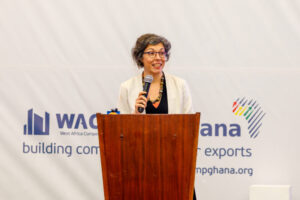
The West Africa Competitiveness Programme (WACOMP), implemented by the United Nations Industrial Development Organization (UNIDO) and funded by the European Union (EU) has concluded in Ghana, after more than five years of work.
The initiative, which had a budget of €6,350,000, aimed to improve the competitiveness of the cassava, mango, pineapple, cosmetics, and personal care product value chains.
The project has had a significant impact, benefiting 48,849 small and medium-sized enterprises (SMEs), including more than 31,000 women-owned businesses, and continuously improving their competitiveness in accessing national and international markets.
Using UNIDO’s 5 Cs for competitiveness (coordinate, compete, conform, connect, and credit), WACOMP improved production, quality compliance, competitiveness and market access of SMEs in the cosmetics, personal care, cassava and fruits sector. This ensured a steady enhancement of productivity, sustainable and inclusive job creation, increased income for the final beneficiaries and improved a sound and efficient Quality Infrastructure System in Ghana.
At the closing ceremony, Irchad Razaaly, Ambassador of the European Union to Ghana, declared: “WACOMP will forever stand as proof that investment in SMEs, agro-business and private sector development is a win for the local entrepreneurs, for the government and the people of Ghana, as well as for our partnership with Ghana.”
Patrick Yaw Nimo, Chief Director of the Ministry of Trade and Industry (MoTI) further highlighted that: “Many of the Ghanaian enterprises struggling to be competitive in the global markets and lacking guidance for the implementation of processes and market standards requirements have improved their capacities to produce products that are fit for purpose and in line with Good Manufacturing Practices (GMPs) and market requirements.”
Thanks to the project, 16 new standards have been developed and promoted to enhance the quality and consumer protection of cosmetics and personal care, cassava products both in and outside Ghana. Furthermore, the Ghana Standards Authority (GSA) Cosmetics Laboratory and Food and Drugs Authority Cosmetics Laboratory are now accredited for ISO 17025, allowing Ghanaian products to be exported with the required certifications.
WACOMP has developed the Sector Export Marketing Plans of the three target value chains and worked closely with the Ghana Export Promotion Authority to promote Ghanaian SMEs in the international market. More than 500 market linkages have been established and Ghanaian SMEs are now present in the digital market and exporting regularly.
The project also ensured that more than 500 SMEs could be linked to financial institutions, to access appropriate and affordable credit schemes, for a value beyond four million Ghanaian Cedis.
Ebe Muschialli, UNIDO Project Manager praised the excellent results achieved thanks to the very comprehensive and innovative approach of WACOMP Ghana.
She highlighted that “the impact on Ghanaian SMEs has been tremendous and would not have been possible without the invaluable contribution of all the national partners and the precious support of the Ministry of Industry and the European Union”.
The European Union-funded WACOMP is a partnership initiative between the Economic Community of West African States (ECOWAS) and the European Union (EU). It contributes to regional economic integration and underscores the EU’s commitment to the Economic Partnership Agreement (EPA) with West Africa. In Ghana, the program was implemented by UNIDO in coordination with the Ministry of Trade and Industry (MoTI).